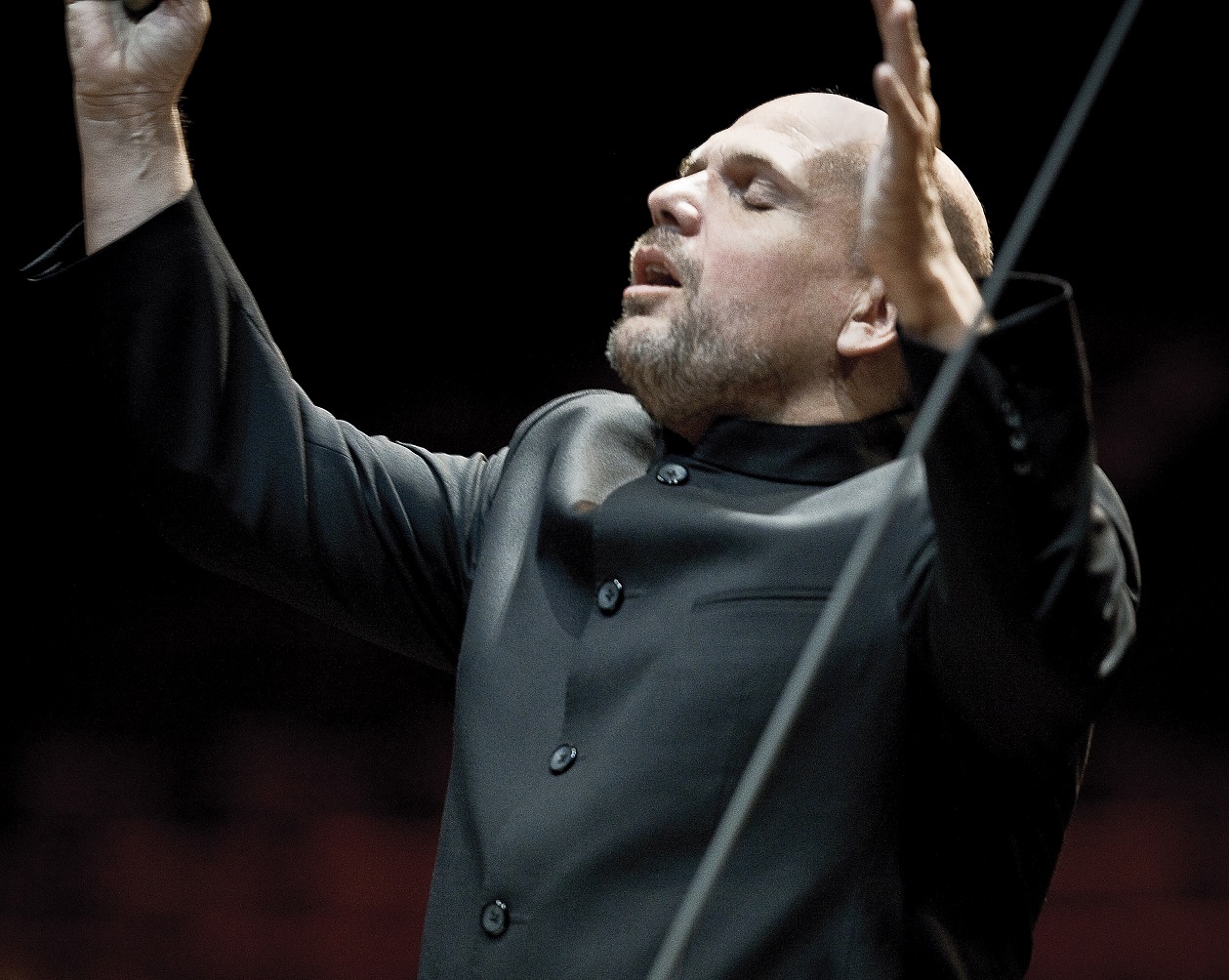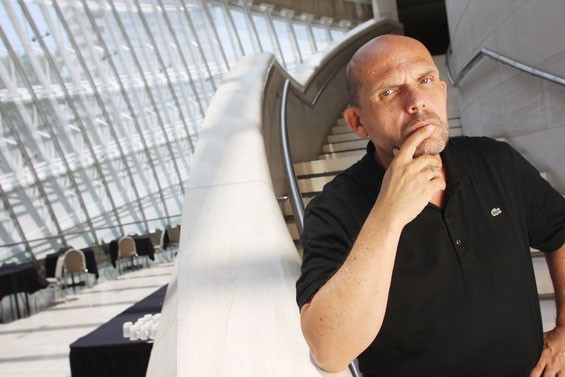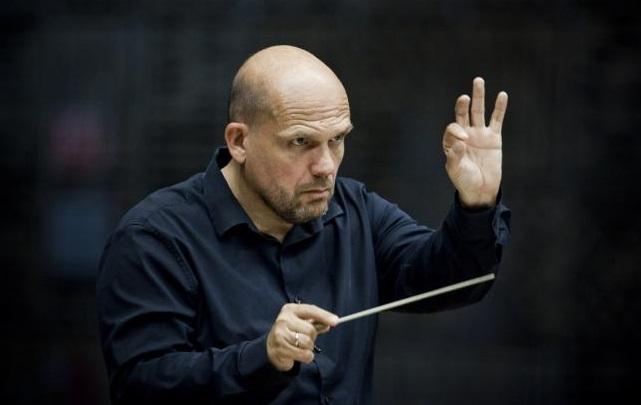Jaap van Zweden is going places. At 55, he is already 16 years into a second high-profile musical career. His first, as a violinist, saw him appointed leader of the Concertgebouw, the youngest ever to hold the position. From there, he moved to the conductor’s podium, and is now Music Director of the Dallas Symphony and the Hong Kong Philharmonic. According to some rumours, he is also under serious consideration for the New York Philharmonic. But when we met, our conversation began with a more immediate engagement, the première of Magnus Lindberg’s Second Violin Concerto with Frank Peter Zimmermann, which Zweden was conducting the following evening with the London Philharmonic.
“Working with a living composer, it’s very exciting. We have so many questions that usually go unanswered, so it is wonderful to get feedback from the person who wrote the piece. That is a very luxurious moment in our lives.” Being a violinist himself must surely help in conducting a new violin concerto. “I have to be very careful that I am involved in the orchestra and not too much involved in the violin. When I started to conduct, it was a little trap for me, but not any more. I’m used to this combination of violin solo and being the one who should serve the soloist and not be involved too much with the solo playing.”
The great orchestras are the orchestras who work really hard
Zweden led the Concertgebouw for 16 years. Does he feel that he’s a product of that orchestra? “Partly yes. I really learned in that orchestra to paint with different types of colours. If we would get for instance one week Bernstein or Guilini we would really paint with oil paint. And then we would get Harnoncourt the week after and then we would paint more with watercolours. So, yes, I’m a product of the Concertgebouw.”
With so many huge musical personalities on the Concertgebouw podium, it is hard to know where to begin tracing the roots of Zweden’s conducting style. He’s a seasoned Brucknerian, having just completed an excellent recording cycle with the Netherlands Radio Philharmonic. I suggest there is a lot of Haitink in his Bruckner. “First of all, that’s a very big compliment, so thank you. But it is different, because my Bruckner is a little leaner than his. But on the other hand, his big lines are always an example for me. But I’m also interested in the details when I rehearse. In the details is the real treasure of a piece. The little details serve the big lines. I remember that Haitink trusted so much the Royal Concertgebouw Orchestra. He just let go. I don’t trust anybody yet as he did, maybe because that’s my age.”
Clearly, Zweden doesn’t leave anything to chance. He’s well known among orchestral musicians for his intensive rehearsal technique. “Discipline in preparation makes you free on stage,” he tells me. “Haitink was very free in rehearsals, and, for me at least, that was not the easiest way to play. I like a little bit more structure in the preparation.” Is Haitink’s trust in his orchestras a personal goal for Zweden then? “You need an orchestra that is in incredible shape, to have this trust. Not all the great orchestras are always in great shape. You need to bring them there sometimes.”
 Zweden is also known as an orchestra builder, a conductor who can raise standards and give an orchestra a real sense of identity. Much of his work is with the world’s greatest ensembles, but he expects just as much commitment from them. “I think that the great orchestras are the orchestras who work really hard, and not just go on routine.”
Zweden is also known as an orchestra builder, a conductor who can raise standards and give an orchestra a real sense of identity. Much of his work is with the world’s greatest ensembles, but he expects just as much commitment from them. “I think that the great orchestras are the orchestras who work really hard, and not just go on routine.”
When Zweden says “routine,” I hear “tradition”. But he assures me he is sensitive to tradition, just so long as orchestras don’t see it as something to fall back on. “I think a tradition should never be taken as a thing that is there and that’s it. A tradition should be alive. In other words, every tradition needs work.”
Which brings us to the New York Philharmonic, and the recent rumours that he might be in line to take charge there. Performing traditions could hardly be stronger than theirs, especially when it comes to the late Romantic repertoire he’s best known for. But Zweden is not intimidated by their prestige, and he’s happy to take on the traditions as the players see them.
“We did a Mahler symphony and they said that their bowing was from the time of Lenny. And I told them, I played this piece many times with him, and this is not Lenny’s bowing. So I introduced the bowing Lenny did with the Royal Concertgebouw and they were very surprised. They did not remember the bowing. So what is tradition in this case? But the DNA of Lenny is in that orchestra. It is a phenomenal orchestra.”
So far, Zweden has only worked with the New York Philharmonic four times, but it already feels like a good fit. “It has been an enormous, fine relationship, very inspiring from the start actually.” What are his chances? “There are lots of contenders probably, so I don’t know.”
I think it is very important for me as a musician to do more contemporary music than before. It inspires me
Different challenges face the conductor in Hong Kong, where he has been applying his orchestra-building skills to the Hong Kong Philharmonic. Given his work ethic, it sounds like another excellent fit. “The downside is that they don’t have a tradition, a certain culture in their brain. But they are extremely eager. There is incredible technical ability and there is not a big ego in the way. So they are open-minded and really willing to observe all the things we work on. I just did a Beethoven cycle in the last four weeks with them. Amazing what kind of quality they played with. We are doing the Ring cycle now. It is completely new for them, but still they delivered quite a wonderful Rheingold. The nice thing about it is that it is their first time, it is my first time, so we are together in this great journey. The audiences too. They are proud to be part of an orchestra which is making history for itself.”
Another recent success story is the Dallas Symphony, who have been on an upward trajectory since Zweden took charge in 2008. He is bringing the orchestra to the UK in April as part of a European tour. So how does touring benefit an orchestra’s work? “To have an international sound you’ve got to go international. We are bringing one programme which is Shostakovich Seven with a Mozart Piano Concerto. The other is Beethoven Five and then the first act of Die Walküre.” An impressively diverse list, no doubt designed to show off the orchestra’s versatility. “I think so. A great orchestra needs to be a chameleon, to play great classics, great Wagner, and to be as flexible as you can with singers. This palette of colours, of styles, I like to bring with me on tour.” (Pictured above, conducting Mahler with the Dallas Symphony; below, by Mark Graham, at the concert hall there.)
 Diversity seems to be the keyword for Zweden’s career at the moment. His international reputation rests largely on Austro-German Romantic symphonies, particularly Beethoven, Mahler and Bruckner. But now he’s moving in new directions, expanding his repertoire into some surprising areas. “There is one part that not a lot of people know about me; with the Radio Philharmonic in the Netherlands I did tons of new music, but I haven’t done much of that internationally. So this is something I would like to focus more on as well.” When I ask which composers, I get an impressively broad survey of the big names working today: Christopher Rouse, Steven Stucky, Mason Bates, Jennifer Higdon, James MacMillan, Wolfgang Rihm.
Diversity seems to be the keyword for Zweden’s career at the moment. His international reputation rests largely on Austro-German Romantic symphonies, particularly Beethoven, Mahler and Bruckner. But now he’s moving in new directions, expanding his repertoire into some surprising areas. “There is one part that not a lot of people know about me; with the Radio Philharmonic in the Netherlands I did tons of new music, but I haven’t done much of that internationally. So this is something I would like to focus more on as well.” When I ask which composers, I get an impressively broad survey of the big names working today: Christopher Rouse, Steven Stucky, Mason Bates, Jennifer Higdon, James MacMillan, Wolfgang Rihm.
So why now? “Because it is inspirational. The time is here for me to say, look, I have a name for certain composers, but I would like to show you a little bit more of what I have under my belt. I think it is very important for me as a musician to do more contemporary music than before. It inspires me, and I think that my St Matthew of Bach will be a better St Matthew if I do contemporary music. And the more I do Bach my contemporary music will be better. So all those different styles and all those different composers influence each other and make me a better musician.” To judge by the London Philharmonic programme he’s prepared, Zweden plans to sweeten the pill by coupling new works with old favourites (Beethoven’s Seventh Symphony follows the Lindberg premiere). “I strongly believe in connections, especially between composers of now and the past. And, of course, if there is a good combination with a piece that will fill the hall, there’s nothing wrong with that. The more people the better.”
Another surprise on the London Philharmonic programme was the Cyrano de Bergerac Overture by Johan Wagenaar. But rarely heard Dutch works are becoming a staple of Zweden’s concerts. “In the past, I would say the Dutch were not the greatest composers, but latterly there are some beautiful composers. If I can be an ambassador for great composers from your country, from Germany, from Russia, why not also from my own country? So I would like to make a balanced mix of composers I would like to bring more into the halls worldwide. I see it not only as an obligation; I see it also as being a little bit proud of my countrymen.”
A final new dimension to Zweden’s career will remove him from the concert hall all together, at least for significant stretches. He has established an impressive reputation for concert performances of operas, leading to several excellent commercial recordings, especially of Wagner. He is now planning to take all that experience into the opera house and spend a significant proportion of his time working on staged presentations. He’ll be starting at the very top, with a production of Lohengrin at Vienna State Opera in May 2016. But there will be much more to his operatic career. “I also did quite a lot of bel canto operas in Amsterdam. And I’m interested in modern opera, and Dutch opera. There are just so many things that people don’t know about me yet....”















Add comment